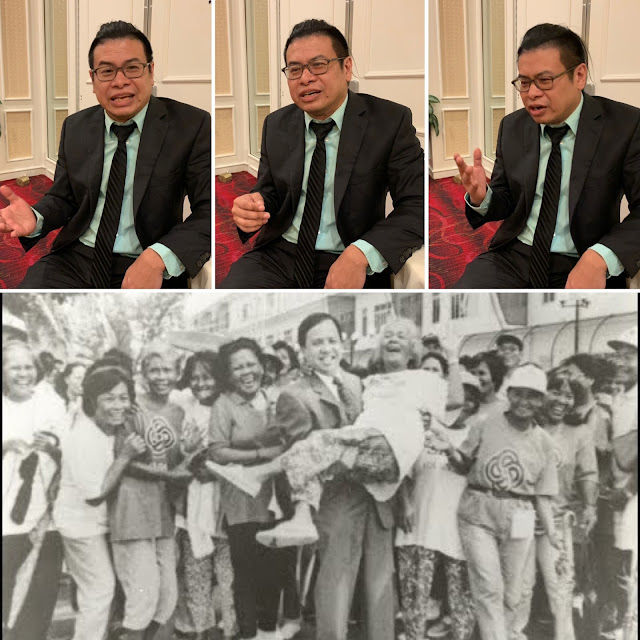Jay Gatchalian heard from a friend that Richard Gordon, then the mayor of Olongapo City would be talking at the George Washington University. He’d been following news about Mt. Pinatubo and the vote to kick out US military bases in the 1990s, so he was curious.
The afternoon would prove momentous for the young University of Virginia student - drawing him back to the Philippines for an adventure of a lifetime, joining about a dozen other college-age Fil-Am who volunteered to be Gordon’s cadres.
Jay’s eyes still light up recounting that episode. He admitted he was listless, shifting majors at UVa to his parent’s consternation who urged him to pick one and stick with it.
“I wanted to get out of school,” Jay said, adding he scrounged around for money to buy a plane ticket to Manila. “I came because he inspired us to go to Subic. He showed how we can make it happen.”
After a year in the Philippines, he returned to Virginia grounded, sure of the future he wanted. He said he saw the best and worst in the Philippines.
Subic naval base was as large as Singapore in acreage, the key American logistics hub during their war in Vietnam (1959-1973) and R&R destination. In September 1991, the Philippine Senate voted to junk the Military Bases Agreement, effectively evicting the US from its largest overseas air and naval bases.
But just months earlier, Mt. Pinatubo - a volcano that lay dormant for centuries - erupted, blanketing both Subic and Clark bases in feet of mud and volcanic debris. The double whammy prompted the US to call it quits, mounting an evacuation that makes Kabul look like child’s play in terms of the numbers of Americans who had to be moved Stateside.
Subic Base, cannibalized and buried in lahar, still held vast value and resources. Manila didn’t have a contingency plan, so it was left to Olongapo City Mayor Gordon. His plan rested on the patriotism, commitment and imagination of about 10,000 Olongapo residents who agreed to invest in Subic upfront - cleaning, repairing and restoring, pulling it up from the dead on the promise of future jobs.
This was when Jay and the other Fil-Am recruits came in. They were bright-eyed 20-somethings who’d taken sabbaticals from colleges across the US and in the Philippines - lured by the tale of Gordon’s large army of unpaid volunteers, a vision of grassroots development and the opportunity to be part of that seeming miracle.
Jay was born in Manila but moved to Virginia when he was in sixth-grade. He was one of four UVa undergrads and another from Virginia Tech who decided to take a year off to follow “The Boss” - as they called Gordon - working as executive assistants and getting to work on “real projects”.
When Fedex founder and CEO Frederick Smith met the Filipino mayor in Memphis, TN, he was surprised to see the young faces sitting in the high-stakes conference. “They are my assistants,” Mr. Gordon introduced them, making a point of mentioning Ivy League backgrounds.
In another instance, they were bundled up for a meeting in Hongkong. It turns out Mr. Gordon was making a pitch to Walt Disney, that was then hunting for a location for their Asia Disneyland.
“Subic has an airport. We had the land, the roads,” Jay narrated, “so we were competitive but they always had China in mind.”
“I believed they met with us to raise their bargaining chips with China, because they could say, see we have other offers,” Jay recalls amusedly.
When they accompanied Mr. Gordon to New York, they found their way to a large conference room, Jay recalls, that had a table filled with goodies that he sheepishly confessed he started stuffing into his pockets. A gentleman sauntered in, engaging him in light banter that ended with him professing admiration with the firm they were talking to, and the man matter-of-factly wishing Jay might join the firm in the future. He would later learn he had swapped small talk with Michael Bloomberg who of course owned the company they were meeting with.
But working in Subic wasn’t always positive. As a Gordon staffer, there was a time when a reporter sought him out for an interview, Jay remembers. As the scribe finished questioning, he asked for money. He recalls being recoiled by the ask. “Well,” the reporter said, “your story is not coming out”.
Jay said his year in Subic provided him an education he could never get in any university. “I was 21 and eager to make a difference,” he declared. He said he’d endorse any program for young Fil-Ams to get involved in “real projects” in the Philippines instead of acting as simple observers.
The group still keeps tabs with each other, the last time when they joined a Zoom call to wish the now-Sen. Gordon, in isolation after getting the Covid 19 virus, a 76th happy birthday last August.
He said some of them decided to stay in the Philippines. Like him, Anna “Trish” Bantug-Herrera returned after two years in Subic, where she honed skills in economic development, including microfinance, mobile technologies, rural and agricultural finance, and reproductive health and family planning - experiences that’s proven invaluable to what she does today.
Trish is an Associate Director of Asia Foundation in Washington D.C.
As for Jay Gatchalian, he decided to take up Michael Bloomberg’s invitation.
Photos (top) Jay Gatchalian and Olongapo City Mayor Richard Gordon Sr. with Subic volunteers; (bottom) Subic Bay sunset during our last vacation in 2019


No comments:
Post a Comment